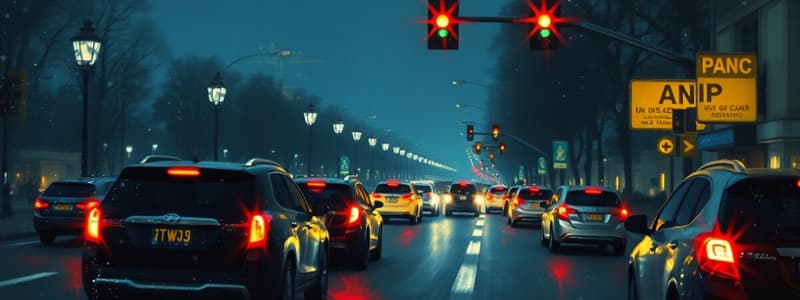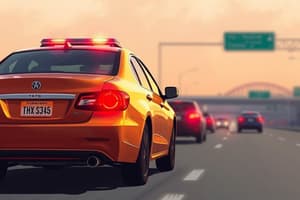Podcast
Questions and Answers
According to the regulations regarding vehicle lighting, during what period must vehicles display lights visible from the front and rear?
According to the regulations regarding vehicle lighting, during what period must vehicles display lights visible from the front and rear?
- From 1 hour before sunset to 1 hour after sunrise.
- From 1 hour after sunset to 1 hour before sunrise.
- From 1/2 hour after sunset to 1/2 hour before sunrise. (correct)
- From sunset to sunrise.
Who is primarily responsible and liable for ensuring a vehicle has the required lights displayed during the specified periods?
Who is primarily responsible and liable for ensuring a vehicle has the required lights displayed during the specified periods?
- The manufacturer of the vehicle.
- The owner of the vehicle.
- The driver or custodian of the vehicle. (correct)
- The registered operator of the vehicle.
Which of the following individuals or groups has the authority to enforce the vehicle lighting provisions?
Which of the following individuals or groups has the authority to enforce the vehicle lighting provisions?
- The director, his agents and examiners.
- Sheriffs and their deputies.
- Peace officers, constables and selectmen.
- All of the above. (correct)
Under what conditions are parking lights required to be displayed by vehicles parked on a way?
Under what conditions are parking lights required to be displayed by vehicles parked on a way?
A truck weighing 12,000 pounds breaks down on a highway outside of the lighted area of a town. What is required regarding reflective warning devices?
A truck weighing 12,000 pounds breaks down on a highway outside of the lighted area of a town. What is required regarding reflective warning devices?
How should reflective warning devices be placed on a divided highway when a truck stops due to a breakdown?
How should reflective warning devices be placed on a divided highway when a truck stops due to a breakdown?
Under what circumstance is it permissible to not use the reflective warning devices if you drive a truck over 10,000 pounds?
Under what circumstance is it permissible to not use the reflective warning devices if you drive a truck over 10,000 pounds?
What should a driver do with their headlights when following another vehicle at night?
What should a driver do with their headlights when following another vehicle at night?
What is the approximate distance within which a driver must dim their headlights when approaching or overtaking another vehicle at night?
What is the approximate distance within which a driver must dim their headlights when approaching or overtaking another vehicle at night?
A driver is approaching another vehicle on a rural road at night. What action should they take regarding their headlights?
A driver is approaching another vehicle on a rural road at night. What action should they take regarding their headlights?
If a vehicle is parked on a street with functioning streetlights during a clear night, are parking lights required?
If a vehicle is parked on a street with functioning streetlights during a clear night, are parking lights required?
A vehicle is stopped on the shoulder of a highway due to a flat tire. It is 1 hour before sunrise and the weather is clear. Are hazard lights or reflective warning devices required?
A vehicle is stopped on the shoulder of a highway due to a flat tire. It is 1 hour before sunrise and the weather is clear. Are hazard lights or reflective warning devices required?
A tow truck is actively loading a disabled vehicle on a busy street at night. What lighting is required?
A tow truck is actively loading a disabled vehicle on a busy street at night. What lighting is required?
What is the specific reference in the motor carrier safety regulations that dictates the compliance standards for the bidirectional reflective warning devices?
What is the specific reference in the motor carrier safety regulations that dictates the compliance standards for the bidirectional reflective warning devices?
What should be the placement of reflective warning devices on a two-way road when a truck is stopped?
What should be the placement of reflective warning devices on a two-way road when a truck is stopped?
If a driver violates the lighting regulations, to whom would the penalty be applied?
If a driver violates the lighting regulations, to whom would the penalty be applied?
What is the weight threshold above which a truck must carry reflective warning devices?
What is the weight threshold above which a truck must carry reflective warning devices?
You are driving a truck over 10,000 lbs on a divided highway at night and need to stop. You place the reflective devices. Which placement is correct?
You are driving a truck over 10,000 lbs on a divided highway at night and need to stop. You place the reflective devices. Which placement is correct?
When are parking lights NOT required for a vehicle parked on a public way?
When are parking lights NOT required for a vehicle parked on a public way?
If you are driving at night and come within 100 feet of another car, what is the best course of action regarding your headlights?
If you are driving at night and come within 100 feet of another car, what is the best course of action regarding your headlights?
Flashcards
Period of Lighting
Period of Lighting
From 1/2 hour after sunset to 1/2 hour before sunrise, vehicles must display lights visible from front and rear.
Party Responsible
Party Responsible
The driver or custodian of a vehicle is responsible for ensuring the vehicle has proper lighting.
Parking Lights
Parking Lights
Parking lights must be displayed when parked on a way from 1/2 hour after sunset to 1/2 hour before sunrise, and during poor visibility conditions.
Reflective Warning Devices
Reflective Warning Devices
Signup and view all the flashcards
Dimming Lights
Dimming Lights
Signup and view all the flashcards
Warning Device Placement on Divided Highways
Warning Device Placement on Divided Highways
Signup and view all the flashcards
Warning Device Placement on Other Roads
Warning Device Placement on Other Roads
Signup and view all the flashcards
Study Notes
Use of Lights
- Every vehicle, whether stationary or moving, must have visible lights from a half-hour after sunset to a half-hour before sunrise. The lights should be visible from both the front and rear
Responsibility for Lighting
- The vehicle's driver or custodian is responsible for ensuring lights are properly displayed and is liable for penalties under RSA 262:41.
Enforcement of Lighting Regulations
- The director, agents, examiners, sheriffs, deputies, peace officers, constables, and selectmen are authorized to enforce these lighting regulations.
Parking Lights
- Parking lights must be displayed when a vehicle is parked on a road from a half-hour after sunset to a half-hour before sunrise.
- Parking lights should also be used when rain, snow, or fog impairs visibility.
- Parking lights are not required if the vehicle is clearly visible due to street or other lights.
Reflective Warning Devices
- Trucks, buses, or truck-tractors over 10,000 pounds GVW operating outside lighted areas of towns and cities must have 3 bidirectional reflective warning devices approved by the director and compliant with 49 CFR part 393.95(F).
- These devices are to be used except when stopping momentarily under conditions described in RSA 265:112.
- For divided highways and one-way roads, place one warning device within 10 feet of the rear, one 100 feet behind, and one 200 feet behind the vehicle, all on the traffic side.
- On other roads, place one warning device 10 feet in front or rear , one 100 feet to the rear, and one 100 feet to the front of the vehicle on the traffic side.
Dimming Lights
- Drivers must dim headlights when approaching, overtaking, or following within approximately 150 feet of another vehicle from a half-hour after sunset to a half-hour before sunrise.
Studying That Suits You
Use AI to generate personalized quizzes and flashcards to suit your learning preferences.



